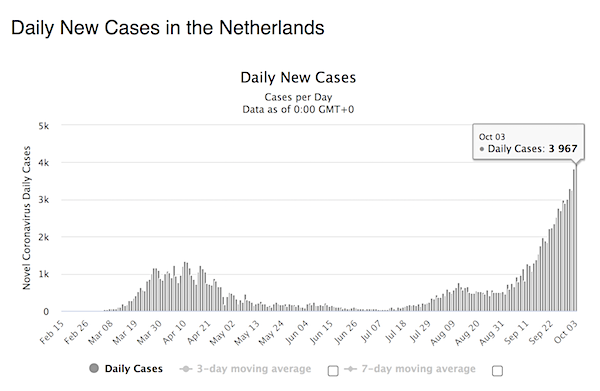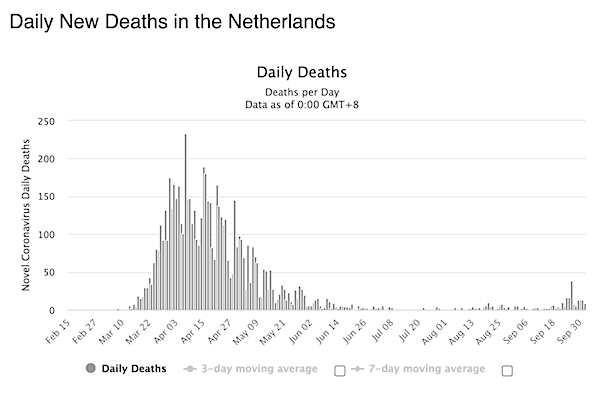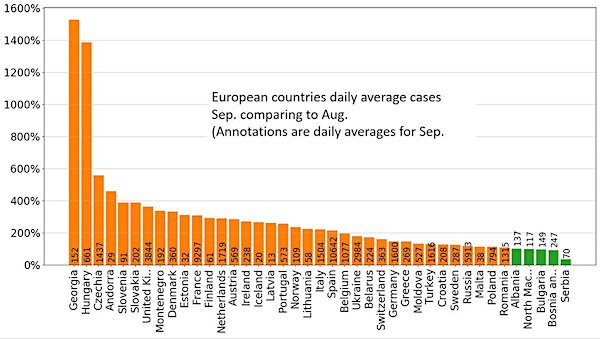
Herbert Draper Lament for Icarus 1898

Is it still allowed to talk about COVID without mentioning Trump? I am not sure. And now I did it anyway. Nassim Taleb made an interesting point about that:
Friends, was it the rose garden or the inside party? pic.twitter.com/7j2L28prmw
— Nassim Nicholas Taleb (@nntaleb) October 4, 2020

Though I don’t follow the news in the Netherlands much, I happened to see something the other day that I think is a “beautiful” example of why so many countries get their “measures” wrong, their lockdowns, facemasks etc.
First of all, they all screwed up their initial lockdowns, which pretty much were March-June all over. And second lockdowns are more something they like to threaten people with than actually considered options. Unless things really get out of hand, if for instance numbers of deaths suddenly increase a lot, but given the change towards infections occurring in much younger people than before, that is not likely. Plus, of course, no-one wants even more economic damage.
And now what you see is the politicians don’t know what to do anymore. They turn to “their scientists” again, but many have before given advice that is different from what they say now, that hasn’t worked, and that often contradicts what their colleagues in other countries say. And so everyone starts blaming “the people”.
But the people have mostly obeyed the lockdowns and become experts themselves, or so they think, and seen them go nowhere. That makes the positions of politicians and “experts” much weaker than it was 6-7 months ago. It’s about credibility, and they’ve squandered it. Why “must we listen to the scientists” if that does us no good?
The Netherlands, like many European countries, is in a second wave that is seeing many more new daily cases than in spring. Partly due to more testing, but not entirely:

The number of deaths does not show a similar trend, which can be contributed to the infections mostly occurring in much younger people, and of course a better understanding in medical circles of the virus. However, hospitals are still filling up much faster than in June-July, and many younger people, too, end up with damaged brains, lungs, hearts etc.

This recent chart of the difference between August and September infection numbers throughout Europe is skewed because of the insane increases in Hungary and Georgia, but it shows that a 300% increase was entirely normal in that timeframe.


So what now? The Dutch government came with a whole new set of measures starting October 2. Because people “don’t obey the rules”. And people increasingly say: maybe the rules are not right. By the way, facemasks are not mandatory there in stores and other public places, there is only an “urgent” government advice to wear them. That is different from many other nations. Here are the new measures per Google Translate:

• Work from home as much as possible.
• Receive up to 3 guests at home.
– Children up to and including 12 years are not included.
• You may meet with a group of 4 people.
– For example in a cinema or restaurant.
– Children up to and including 12 years are not included.
• A maximum of 30 people may be together in an indoor space.
– Children count.
• Cafes, bars and restaurants close at 10 p.m. You must be gone then. You can enter until 9 p.m.
– You provide your name and telephone number. If someone gets sick who has been in the restaurant or cafe, you will receive a call.
• You must make a reservation to visit a museum or library.
• Stores only allow customers if there is enough space.
• In supermarkets there will be special shopping hours for the elderly and the sick (people with poor health).
• People with a contact profession must register customers. For example hairdressers.

The first reaction that I have, and I’m sure I’m not the only one: Why 3 people as house guests and not 4? Why 4 people at a restaurant table and not 5, or 30 total in an indoor space? There are family members we haven’t seen since Christmas, but a birthday party is out?
Where do those numbers come from? Did you just make them up? Also, closing bars and restaurants at 10 pm is going to be the death knell for many of the few that are left. Is that worth it?
About that number of 4 people at a restaurant table, the next article from NLTimes about worries in the hospitality sector says that in neighboring Germany and Belgium, 10 people can sit at that same -or preferably a bigger- table. Are Dutch people supposed to drive to those countries if they have a party of 8?
Gov’t Advice To Wear Masks In Public Space Met With Skepticism
On Wednesday Prime Minister Mark Rutte issued the urgent advice for all Netherlands residents to wear masks in publicly accessible indoor spaces. This advice was met with skepticism, especially from the hospitality industry. Former RIVM director Roel Coutinho would rather have seen a mask obligation instead of advice.
Hospitality association KHN doubts whether the advice to wear masks in public makes sense, the association said in a press release. “The fact that there is still no scientific substantiation by the cabinet and RIVM about the proven usefulness of face masks certainly does not help to create and maintain support. Moreover, face masks still form an extra barrier to visiting establishments.”
If the government turns its advice into an obligation, the KHN wants the Netherlands to follow Germany and Belgium’s example. According to the association, in those countries up to 10 people are allowed at a restaurant table. “Then we will be open to it,” the association said. The KHN also wants extra financial support should masks become mandatory.
Roel Coutinho, who preceded Jaap van Dissel as head of public health institute RIVM, is pleased that the advice to wear masks indoors now applies to the whole of the Netherlands, but regrets that the government did not make it mandatory. “On the basis of all the literature, I am convinced that wearing a face mask is useful. But only advice makes it particularly difficult for people,” he said to Nieuwsuur. “An obligation, as is also happening in countries around us, gives everyone much more clarity.”
An obligation will also help the stores that have to enforce the face mask rule. “Because what exactly should those shops or supermarkets do?” Coutinho said. “Because it only concerns urgent advice, the responsibility now lies with shops, which makes it very difficult. An obligation is not always pleasant, but it is clear and easy to enforce.”
But the best part is the following, the initial piece that got me thinking about this. Turns out that at the same moment the government issues an “urgent” advice to wear them, with a threat of making them mandatory, its chief Infectious Diseases expert, the Dutch Fauci, says he sees little benefit is wearing non-medical masks. As, ironically, Fauci, who used to say they were useless, now calls them very beneficial. Google translate again:
Van Dissel Insists: Ordinary Face Masks Have Little Effect
The frequent use of masks in other countries, the pressure of public opinion in his own country, or even a direct appeal from his famous American counterpart Anthony Fauci: Jaap van Dissel sticks to his position. When asked, the director of Infectious Diseases at the RIVM repeats that, according to him, masks have “an exceptionally small effect” on the attempts to contain the spread of the corona virus. In an interview with the NOS, he calls the cabinet’s recent decision to urgently recommend masks in public indoor spaces, therefore primarily a political decision rather than one based on medical grounds.
Since the start of the corona crisis, Van Dissel has emphasized that he sees little benefit in wearing non-medical face masks, especially because it could evoke a sense of false security and possibly divert attention from other rules. Although he acknowledges that there are studies that signal a positive effect of face masks, he believes they are difficult to extrapolate to the corona crisis.
“For example, medical mouth masks were often used in those studies and measures such as the one and a half meters are not taken into account,” he explains. There are also studies that are less positive about masks, he says. “That leads us to consider that we have not given a positive advice about it. That is just the story. That another decision is taken, based on political considerations, that it should be so.”
In addition, according to Van Dissel, the alleged effectiveness of non-medical face masks is nothing compared to the usefulness of other measures such as keeping sufficient distance from each other, washing hands regularly and staying at home in case of complaints. Earlier this week, the Outbreak Management Team, the advisory body of the cabinet which Van Dissel chairs, made some adjustments to the advice on face masks for the first time.
For example, the OMT wrote that masks could be recommended in places where sufficient distance from each other cannot always be kept “such as in busy shops”. For the same reason, a mask has been mandatory in public transport since June. According to Van Dissel, the change in the OMT advice has nothing to do with a changed view of mouth masks, but more to do with people’s sense of safety. “Of course, as OMT, we have also realized that some people would prefer to wear a mouth mask. If someone feels safer, we are fine with that,” he says.
The government says: wear a mask, and its chief scientific adviser says: don’t bother. Great message. And people don’t miss that. I’ve said it before: every government today should have a generous supply of N95 masks ready. They don’t because their experts long said they were not necessary. While some keep claiming cloth masks are useful, but “more to do with people’s sense of safety”.
I don’t know about you, but all these people with these useless masks on where they’re not needed, like outside, don’t make me feel safe at all. They make me think I’m surrounded by fools. And is anyone going to believe that 4 at a table is better than 10? How can they when just across the border the opinion is so different? If you ask me, the time of being able to order your citizens around on what to do and what not, may be ending for many governments. And they have only themselves to blame.
The only realistic thing to do at this point appears to be to give people back their own responsibility. If only because taking it away from them didn’t work.

We try to run the Automatic Earth on donations. Since ad revenue has collapsed, you are now not just a reader, but an integral part of the process that builds and maintains this site.
Click at the top of the sidebars for Paypal and Patreon donations. Thank you for your support.

Support the Automatic Earth in virustime, election time, all the time.







